Novska Gaming Centre Nominated for Prestigious Emerging Europe Award
May the 9th, 2023 - The Novska Gaming Centre, which has placed an otherwise very much overlooked part of Croatia into the spotlight of a rapidly evolving and wildly popular pastime, has been nominated for the Emerging Europe Award.
As Poslovni Dnevnik writes, the Novska Gaming Centre (Novska Gaming Industry Centre) has been nominated for the prestigious "Emerging Europe Awards" in the "Inclusive Entrepreneurship Initiative of the Year" category. These are awards that Europe gives to regional achievements in sustainability, innovation and entrepreneurship, and the Novska Gaming Centre, which is currently still only in its design phase, has already been duly recognised as a project from which a great deal can be expected.
The Pismo Incubator has pointed out that according to the votes cast so far, the Novska Gaming Centre is in the top three projects.
"The Novska Gaming Centre includes a large campus with a gaming industry accelerator, a faculty building, a student dormitory and all other accompanying sports facilities, as well as an e-sports arena and a business incubator, all intended for the development of the gaming industry here as a whole. The location where it will be located is the Novska business zone, and the building will span a massive 8,000 square metres and will be worth 50 million euros, the financing for which comes from the just transition fund. Considering the successes achieved by the fastest growing Croatian entrepreneurial incubator with its seventy start-ups and numerous projects, we believe that we can win this award,'' they stated from the Pismo Incubator.
The Novska Gaming Centre has been described in the nomination as a project in the making that proves how an industry branch can be created from scratch and successfully developed, which is so far very much in evidence if we look at the example of the Pismo Incubator itself.
"We're at an advanced stage of designing the centre. We obtained the location permit back in December last year, and the designers are currently submitting their applications for the first of five building permits, and that's why we are extremely happy to hear that we've been nominated for this prestigious award in the category of projects that represent the future of Europe,'' stated Andreja Seperac.
For more, make sure to check out our dedicated business section.
Novska Video Game Summer Camp on Offer to Children This Season
June the 23rd, 2022 - During the very height of this summer season, a brand new Novska video game summer camp will be on offer to children of all ages interested in getting better acquainted with this sort of technology which has put Novska firmly on the map.
As Poslovni Dnevnik/Josipa Ban writes, this summer, elementary school students will also be able to get to better acquainted with the interesting world of video game making, thanks to the Pismo Business Incubator and their Novska video game summer camp for kids.
Over a period of two terms during the school summer holidays, students of the upper grades of primary schools will be able to learn to make their own video games during their seven days spent at the camp.
"We're aware of the fact that children spend most of their time in front of a computer playing video games during the summer holidays, so we decided to organise a camp and allow them to spend time in front of the screen learning to produce video games,'' the organisers explained.
The youngest children will be able to acquire new technological knowledge through two terms, from July the 3rd to the 7th, and then from August the 21st to the 28th. Additionally, for elementary school students who decide to take an active, educational holiday, the day will be filled with various activities.
“They will get acquainted with the top technologies boasted by the the Pismo Incubator, in the Social Innovation Incubator they will learn to record, edit and stream content, and in the stem workshops they'll be able to learn about microbits and robotics.
They will also ''programme'' nature, but without computers and mobile phones in the Dupin scout camp, and time is left for a full day trip to the Lonjsko polje Nature Park,'' announced Ivana Matanovic.
Ivan Celjak, Sisak-Moslavina County's prefect, pointed out that the gaming industry brings economic progress to the whole society. “That's why we're pleased with the number of 28 percent more newly opened companies in our county in 2021. Some of these 319 start-ups are gaming companies and that's why it's important to educate children from an early age. We're glad that in addition to more than 200 adults who were educated within Pismo, small game developers now have the opportunity to learn,'' pointed out Celjak when discussing the Novska video game summer camp.
For more, make sure to check out our dedicated lifestyle section.
Andrej Plenkovic Visits Novska Gaming Campus, New Student Dorms
January the 14th, 2022 - Novska is having a complete and utter turnaround, becoming the Novska gaming campus which has just recently been put into function, as have new student dorms.
As Poslovni Dnevnik/Suzana Varosanec writes, it has been less than two years since Novska's former INA building was transferred to the portfolio of that city, which is rapidly positioning itself as the centre of the gaming industry in Croatia. The new building has been put into a new function by being transformed into new student dorms.
This has been a joint project of the City of Novska, Sisak-Moslavina County and the Croatian Government, which was officially opened this week by Prime Minister Andrej Plenkovic, who made sure to emphasise that this is just one project which is transforming Novska into the country's gaming centre as the industry of the future.
Two business incubators are playing host to more than 60 companies specialising in video games, while over 50 percent of the companies engaged in the gaming industry are registered in Novska where young people just keep on coming, which is the nucleus of development and new positioning of the city and the wider county.
In the specific case of the second student dormitory in this county, the education department has a prominent role, which verified a new subject for Novska's students - training to become technicians for video game development, resulting in the need to open the aforementioned student dormitory.
More than half of the students enrolled in this subject of study come from outside of the area, and 21 students will be the new tenants of the new building. According to Prefect Ivan Celjan, there is a recognition of the education and needs of today's students, but also the efforts of parents who are trying to achieve better conditions for their children. Owing to the deep understanding of the above, the student dorms will be fully funded, which means they'll be free of charge for end users.
The new dorms will house students from all over Croatia from Zagreb, Dugo Selo, Bjelovar, Kutinska Lipa, Stari Petrovo Selo, Kumrovec, Bektez, Koprivnica, Vodnjan and beyond, while the interest in the new field of study is unsurprisingly huge given the popularity of video games and the Novska gaming campus.
The Croatian Government has raised subsidies for entrepreneurs to the maximum (within the programme of the reconstruction and revitalisation of the local economy after a series of catastrophic earthquakes at the end of 2020) and this concept is being carried out in cooperation with the CES, being considered a magnet for young people who will come to Novska and hopefully decide to stay following their studies.
For more, check out Made in Croatia.
New Novska Gaming Campus to Attract 50 More Croatian Startups
January the 4th, 2022 - The new Novska gaming campus is the first of its kind in all of Europe, and given that it is located in this often wrongly overlooked part of the country, things can't get moving quickly enough.
As Poslovni Dnevnik/Suzana Varosanec writes, the construction of the Pismo video game industry campus in Novska worth 375.5 million kuna, the first gaming campus in Europe, is a strategic project and a prominent component of the programme of social and economic revitalisation of the areas of Sisak-Moslavina County being assisted post-earthquake, with expected rapid realisation.
The new Novska gaming campus will be constructed on an area spanning eight hectares in the Novljan business zone, and the company that will prepare all the project documentation has already been selected.
''The completion of everything regarding the documentation is expected by May the 1st, 2022, followed by a tender for construction. The decision to include this project in the Revitalisation Programme is a sign of the great level of recognition of the work done so far across Sisak-Moslavina County and Novska,'' said Mario Celan, the director of the Simora Development Agency, which manages the Pismo Business Incubator.
According to Celan, 67 newly opened companies generate about a hundred jobs, while on the Novska gaming campus alone, they expect to open up 80 employment opportunities and attract a minimum of 250 startups, as well as numerous investments from abroad.
A few years ago, he explained, they took the opportunity to develop the video game industry in this particular county, as it is a new and modern industry that is constantly growing, which was the reason for them to head in that direction, and "2 percent of the Revitalisation Programme will be invested in developing competitiveness in the best way possible,'' according to him.
There will also be an eSport arena
The new Novska gaming campus will also include the construction of facilities related to the opening of studios, student dormitories, the Business Incubator for the eSport arena with 4,000 seats and the Accelerator of the gaming industry. There are also extensive plans to have a five-year higher education programme with 50 students per year and a high school programme and accompanying classes with 24 students per year.
For more, check out our dedicated business section.
Croatian Graduate Perspective: The View from Young Pilot Stjepan in Novska
March 7, 2021 – Asked whether he had ever considered moving out of Croatia, a young future pilot Stjepan in Novska said he would be lying if he said no. "After all, my profession's nature is such that it expects me to be a worldly man. But there were also thoughts of leaving based on the state of affairs in the state itself," says Stjepan in our Croatian Graduate Perspective series, and this is his story.
With many young people emigrating from Croatia, what keeps those who decided to stay (at least for now)?
The emigration of young people from Croatia in search of better business opportunities and living standards, unfortunately, is a well-known story. Each of us young people in Croatia knows at least a few people from their environment who, at one point, said that enough was enough and decided to seek happiness somewhere abroad.
According to official Eurostat data, from 2015 to 2019, Croatia's population decreased by 4.26 inhabitants per 1,000 citizens only thanks to emigration. Therefore, the Croatian emigration rate is the second-worst in the European Union (after Lithuania).
These data indicate that economic prosperity influences population decisions to emigrate. Besides, due to the exodus of the young and working population, there is an additional reduction in GDP per capita that closes the cycle of poverty and decline in Croatia.
However, there are many who are aware of the poor position of young people in Croatia but still do not want to give up and decide to stay in Croatia. We're wondering what do those young people, recent graduates, think about this whole situation and what are their reasons for staying in Croatia.
We continue our series with Stjepan from Novska, the most western Slavonian town.
First of all, please introduce yourself. What are you studying/what did you study? Do you have a job currently?
Hello, I am glad that you hosted me in this interview. It is a great honor to be part of a series of interviews where young people's voice is heard. My name is Stjepan, I currently live in Zagreb, and I am studying at the graduate study of aeronautics at the Faculty of Transport and Traffic Sciences in Zagreb. I am attending my last semester before I become a master's engineer in aeronautics. Along with college, I also completed civilian pilot training. I am not actively employed at the moment; I do some student work here and there.
What is it like being a student/recent graduate in Croatia during this coronavirus time?
Being a Croatian student during the coronavirus pandemic has become a bit more complicated. Although the faculty managed to organize almost all the exercises virtually, many projects do not hold precisely because of the coronavirus pandemic. Also, although students are not deprived of Erasmus programs and professional internships, they are deprived of the quality of the same. I believe that live and virtual internships are totally different. You can learn more by going to some of the institutions or companies within Europe.
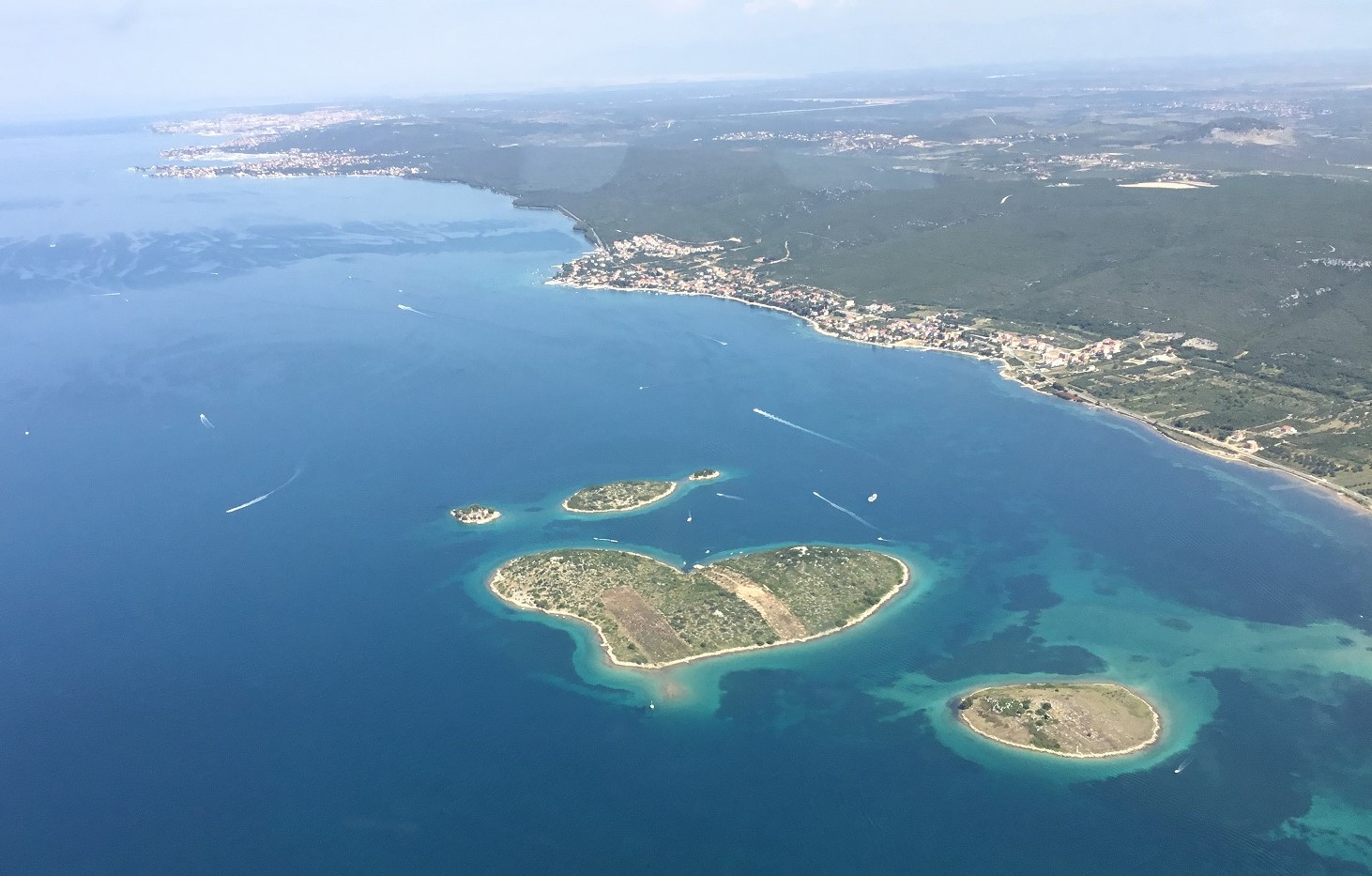
Heart-shaped Croatian island of Galešnjak - just one of many Croatian beautiful landscapes Stjepan sees during his flights
What are your experiences searching for a job in your profession in Croatia?
I have not yet started looking for a job in the profession. Still, listening to older colleagues' experiences, I can conclude that the aviation and air transport industry was booming until 2019 before the pandemic hit Europe. While now, the industry is practically still on its knees. Some experts predict that the industry will return to the old way only in 2024, but that depends on many factors involved in the story. I plan to graduate in the autumn of this year, so my hopes of finding a job in the profession right after graduating from college are very low.
What do you think of the Croatian Government's efforts to provide opportunities for graduates?
The Government is already helping enough because every state faculty in Croatia is free, and tuition fees for full-time students are financed from taxpayers' money. But, of course, it can always be better. Therefore, I also think that the Government should support entrepreneurs financially and develop various support programs to scout gifted students in the lower years of college to offer internships or employment on a student contract in their firms. Of course, taking into account the needs for future staff and that the employee is a student from the appropriate industry.
Many young people your age decide to emigrate from Croatia to find a better job opportunity and/or life standard. What do you think about it?
People have always emigrated from these areas for reasons and priorities known only to them. While I was finishing high school, emigrating abroad just became "in." Then I thought that only people who were less educated or could not make ends meet here in Croatia emigrated, or those who had completed schools for industries that practically and do not exist in Croatia today anymore. Later, it grew into a search for a state with a higher standard of living and reduced bureaucracy. While today, a growing share is made up of highly educated people. Worst of all, I'll probably be one of them one day too.
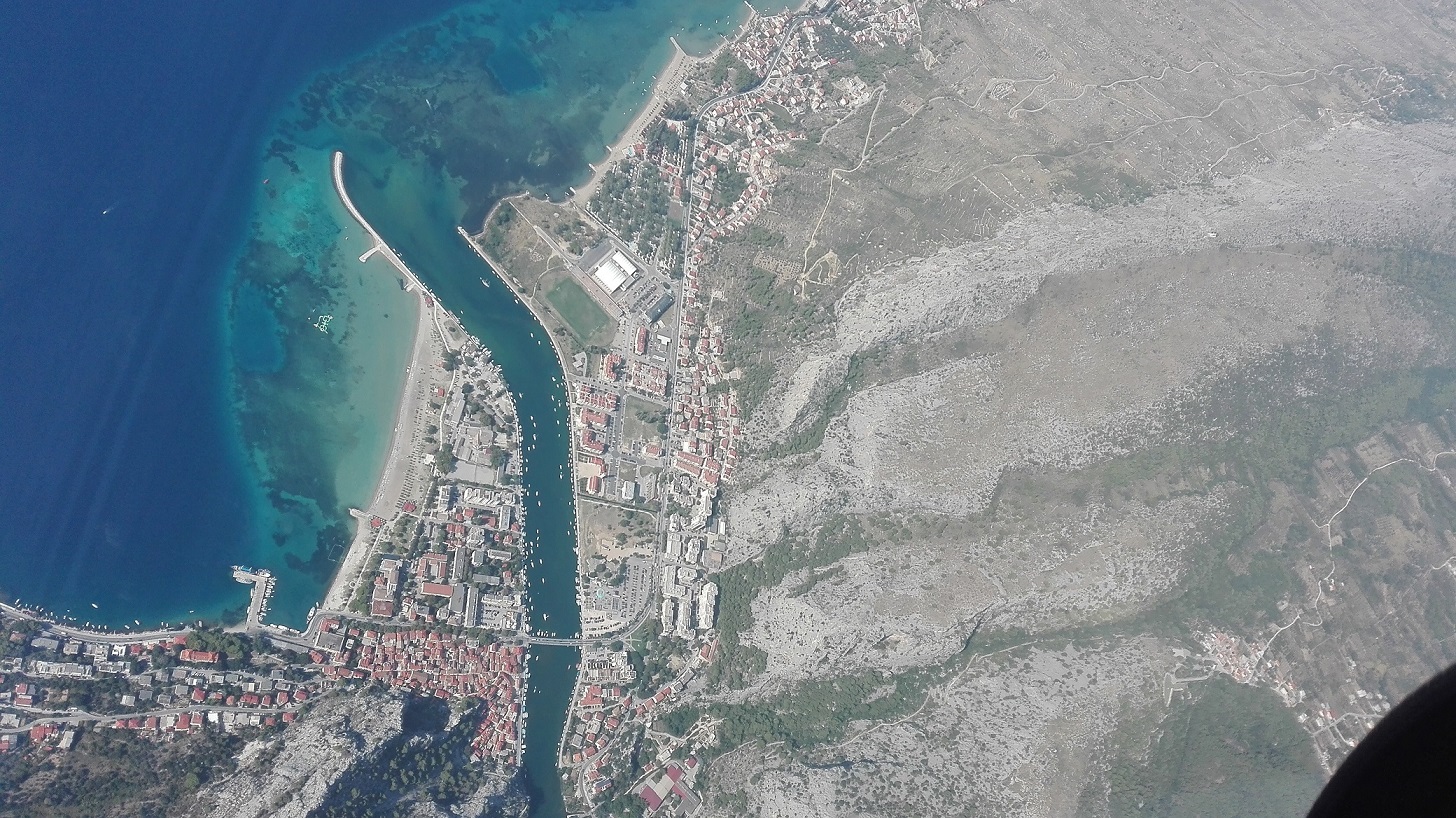
The confluence of the Cetina River and the Adriatic Sea in Omiš
In your opinion, what would encourage young people to stay in Croatia?
Reducing nepotism and corruption, better government and employment policies, lower taxes, attracting foreign capital or money from investment funds for project development or start-up industries. Also, the problem of young people in Croatia is solving the housing issue.
Have you ever considered moving out of Croatia and why?
Yes, I have. I would be lying if I said I haven't. After all, my profession's nature is such that it expects me to be a worldly man. But there were also thoughts of leaving based on the state of affairs in the state itself.
As a recent graduate, what is your impression of the education system in Croatia? What do you think is good about it and what could be better?
I think that Croatia's education system is good, and the grade I would give is 3 or 4, in between. I believe that some things are taught too broadly and that it is ok for primary school. However, in high school, it should be corrected. The compulsory subjects that everyone must have should be determined, and students should choose the rest according to their preferences or psychological tests. About college education, I believe it produces top professionals who can match the world. But unlike the world, too much remains on theory, and, as I mentioned earlier, more practice needs to be introduced.
Based on your own experience, can you say that everything is possible in Croatia if you work hard, work on yourself, are educated and ambitious?
This quote may sound cynical and worn out, but I would like to quote Sylvester Stallone from the Rocky Balboa movie: "It's not about how hard you hit. It's about how hard you can get hit and keep moving forward. How much you can take and keep moving forward."
And I think that quote is valid, especially for Croatia. The only problem is that they never stop "hitting" you here, hahaha. But, yes, if someone has a strong enough motive, they can finish whatever they want. But whether he will succeed and find or get the desired job in the profession or a job in the profession in general, that is the story for another interview.
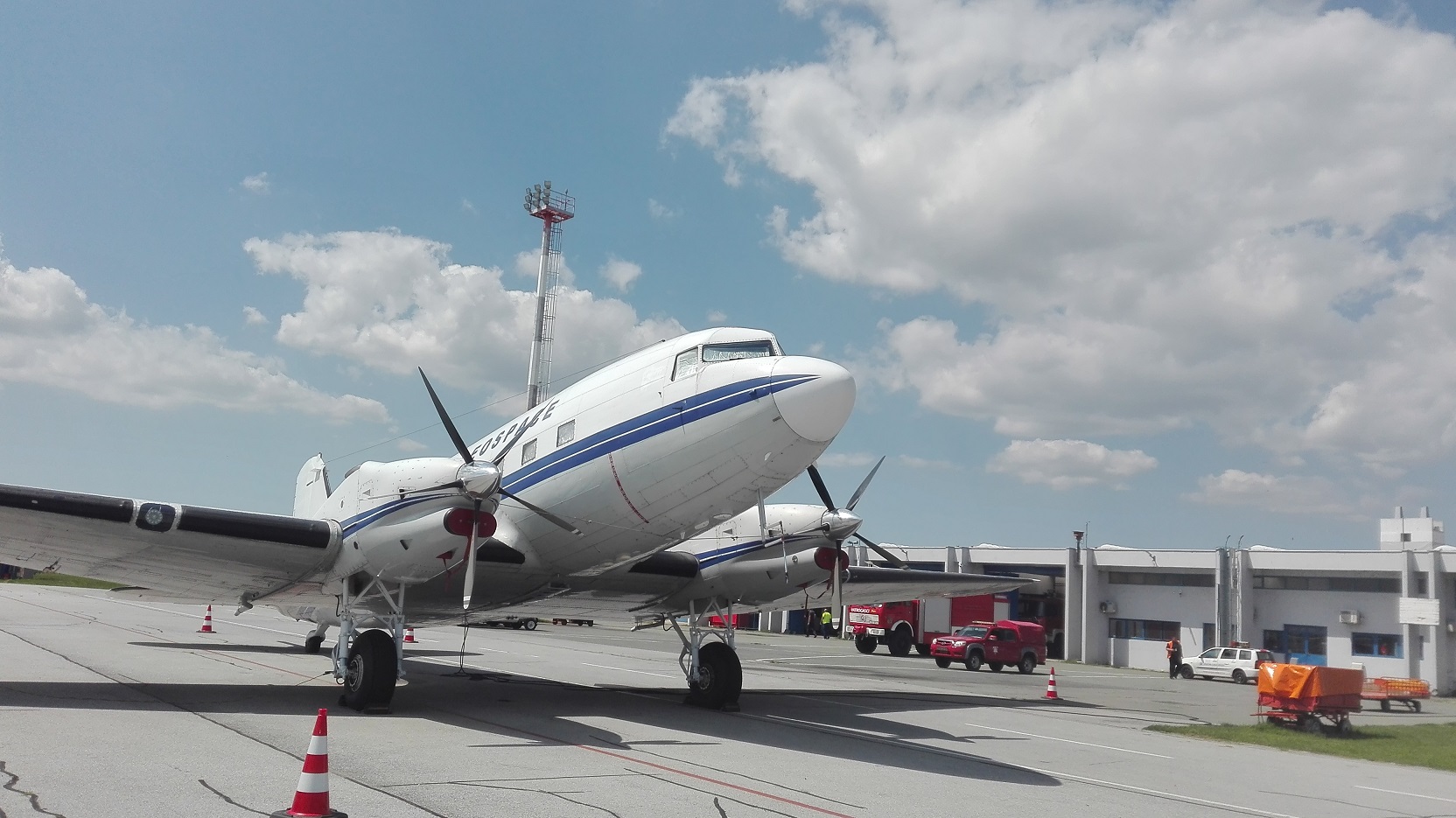
Stjepan says the aviation and air transport industry is on its knees now, making it uncertain for him to find a job
If you could change only one thing in Croatia, what would it be, and why do you think it's important?
That Croatia ceases to be just a country for a good vacation but to become much more than that. Those who read this sentence with understanding will understand the message.
As a young Croatian, what are you most proud of in Croatia?
I am most proud of the country's natural beauty and the people. I had the opportunity to travel throughout Europe, and I have never met people like us. Ready to help a stranger on the street, most people speak a foreign language or at least try to express it. Oh yes, and unity. The unity of my people when it matters and when people need help. That's usually that short period when we don't quarrel with each other to the point of blood about politics, haha.
Are you optimistic or pessimistic about the future of Croatia, and will it be a better or worse place for your children?
I would say I am optimistic. The situation is bad, and I don't know if it will change soon. I believe that you should always go forward and do good in life, and I think that not much can be achieved by going back and pointing fingers.
Also, I believe that a great unity of the people is needed, which is currently undermined by distrust in this country's governing structures. That distrust has fallen on fertile ground and is flooded every day with a new number of people who sat in a vehicle and left their homeland forever.
And about the future when I'll have children, it will be good for them only if I create the necessary conditions for that. That is why I believe that it is our responsibility to create a better future.
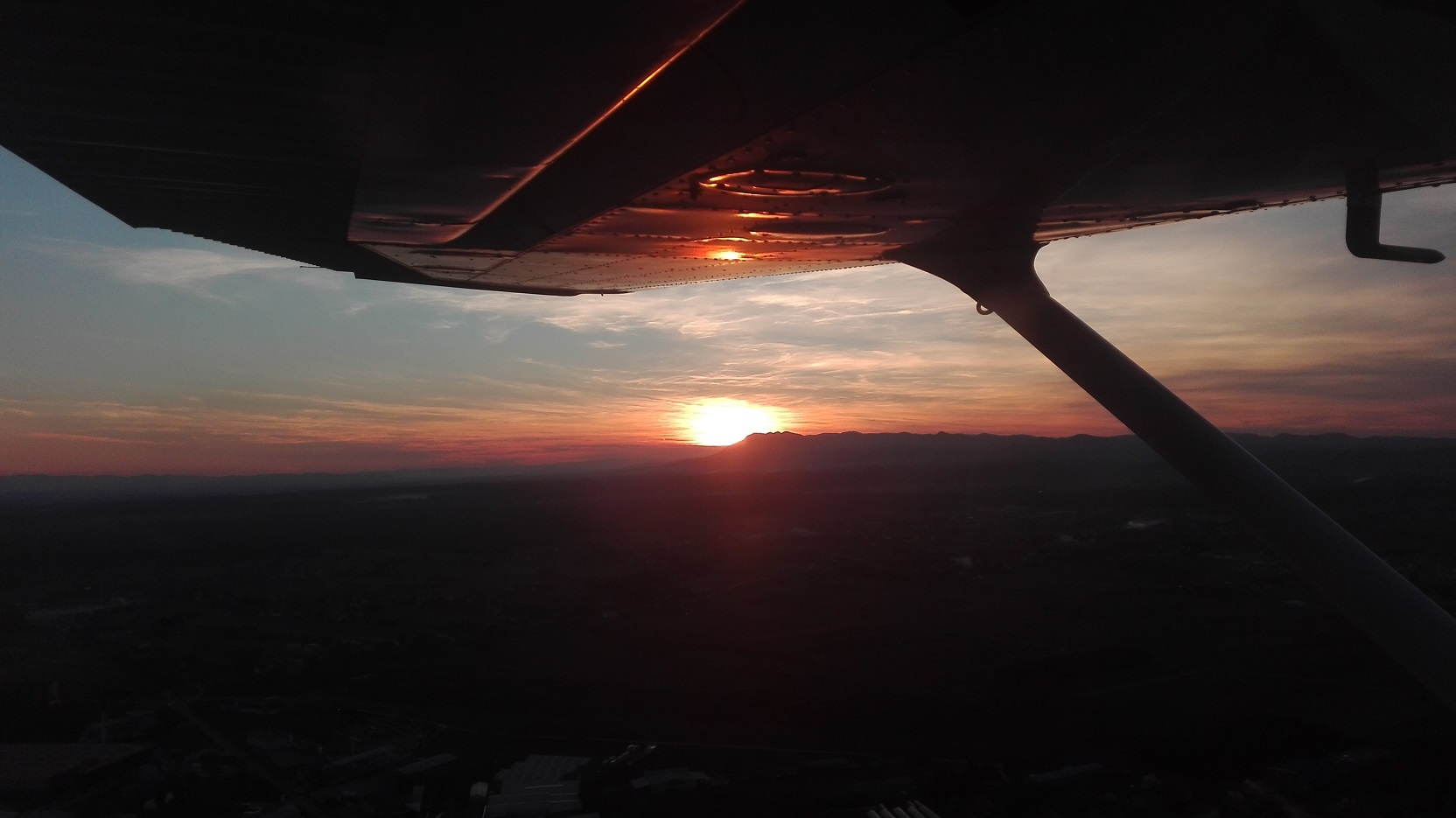
Are you a student or recent graduate who would like to contribute your voice and experiences to this series? If yes, please contact This email address is being protected from spambots. You need JavaScript enabled to view it. with the subject "Graduate."
To read more from the Croatian Graduate Perspective series, follow TCN's dedicated page.
Sisak-Moslavina Development Agency SIMORA Named Best in Europe!
February 18, 2021 – After so much bad news from Sisak-Moslavina County recently due to earthquakes, there finally comes some positive news. Thanks to best practices in regional development, the Sisak-Moslavina development agency SIMORA was named the best in the whole of Europe.
To identify best regional development practices, EURADA, the European Association of Development Agencies based in Brussels, evaluates the best development agencies through their projects. In the sea of numerous and successful European projects, as well as the agencies that design and implement them, it is difficult to find the best on the list of those chosen by the EURADA expert jury. However, for 2020, the Sisak-Moslavina development agency SIMORA, which is also the first award winner from Croatia ever, succeeded.
36 start-ups in the gaming industry
Namely, with numerous projects in entrepreneurship, rural development, strategic planning, social funds, and EU funds, development agency SIMORA created 217 new jobs and preserved over 1000 of them. The EURADA thus recognized it for improving life in Sisak-Moslavina County.
"The European Association of Development Agencies has informed us about the selection, and we expect an invitation to take over the award soon. We were already in the top five European development agencies in 2017, but the first place is really great news for us!" said Mario Čelan, the director of SIMORA.
In selecting SIMORA as the best European development agency, the EURADA jury particularly emphasized the concept of how to develop the region and how to employ young people. It was also important how to educate young people to make video games, mentor them to become entrepreneurs as easily as possible, support their start-ups, and use state-of-the-art facilities and equipment in the PISMO business incubator in Novska.
"Becoming gaming expert-capacities upskilling" is the name of the practice, which was awarded thanks to SIMORA. Ultimately, it resulted in the opening of 36 start-ups and solved the problem of youth employment in a specialized and fastest-growing industry – the gaming industry.
SIMORA also has the best Croatian EU project
"It is a great recognition to receive the status of the best European development agency,' especially since we are the first agency from Croatia that managed to get this title. The year 2020 brought us a lot of written and approved projects, and this award is just the crown of the entire work of SIMORA, which this year celebrates 15 years of work," said Čelan.
On this occasion, he commended all employees who work on all projects, as well as ministries and public administrations from state, regional, and local levels. Without them, he said, SIMORA's projects would not come to life. He also thanked all clients and partners for recognizing SIMORA.
The EURADA award is prestigious because it is not only awarded to members of the association but also all other development agencies based in Europe. In addition to being the best European development agency in 2020, SIMORA also got an award for the best Croatian EU project – the PISMO business incubator in Novska.
Source: Simora
To read more good news from Croatia, follow TCN's dedicated page.
Novska Baby Boom? Families From Across Country Moving to Town
January the 28th, 2021 - 2020 might have been a terrible year for a multitude of reasons, but for Croatia's future gaming centre, Novska, there has been some good news if we're looking at a previously unfavourable demographic picture. The Novska baby boom took place in 2020.
As Poslovni Dnevnik writes, finally some good news has come out of earthquake-stricken Sisak-Moslavina County. The highest number of children were born in Novska last year in comparison to the last six years. A total of 138 babies were born during the so-called Novska baby boom, as many as twenty more than were born in 2019. While Novska, where many families are arriving has done exceptionally well, they’re not the only ones to have recorded a baby boom in Croatia in 2020.
Kindergartens are full, RTL news reports. In the last three years, two such facilities have been expanded and two more have been built, but even that will not be enough. In the autumn of 2020, 278 children were enrolled, which is the highest in the last 45 years! There are now 350 of them.
Preliminary data shows that in as many as thirteen counties across the whole of Croatia, the pandemic-dominated 2020 was actually a very fruitful year in terms of births.
Novska has become the centre of the blooming Croatian gaming industry, offices are being opened there, and in addition to children, new games are also being made. Young people and families from all over Croatia are coming to live here, and yes, that’s why Novska managed to see the arrival of twenty more babies in 2020 than it did the year before, a total of 138. In six or seven years, they will have one whole class of children more.
As previously touched on, according to initial data, another thirteen Croatian counties can boast of having more babies born in 2020 than one year earlier. According to county-level data, Croatia is now richer by 800 children.
For the latest travel info, bookmark our main travel info article, which is updated daily.
Read the Croatian Travel Update in your language - now available in 24 languages.
SIMORA and A1 Croatia Collaborate on Business Incubator in Novska
December 22, 2020 – The Sisak-Moslavina County Development Agency SIMORA and A1 Croatia, a leading technological innovator, have entered into business cooperation to develop the video game industry in the Business Incubator in Novska.
As Jutarnji list reports, SIMORA, a development center for the video game industry, and A1 Hrvatska, a leading technological innovator, have signed a multi-year agreement on cooperation and services exchange.
Business cooperation has common goals: development of the video game industry in the Business Incubator in Novska, including the development of video games on the most modern mobile and fixed technology, promotion of innovations, as well as stronger involvement of ICT industry and video game industry in education, public, and private sector throughout Croatia.
The specific location where the cooperation will take place is the PISMO Business Incubator in Novska, recently declared the best EU co-financed project in Croatia for 2020.
"At a time of unprecedented public health and economic challenges, we are especially pleased that the project of our development agency is recognized by important market participants aimed at digitalization of society, the progress of the local community, and thus the whole of Croatia. I am convinced that the inclusion of A1 Croatia will further accelerate the achievement of the goal of our county becoming a true center of the gaming industry, the fastest growing industry in the world," said Ivo Žinić, prefect of Sisak-Moslavina County.
The PISMO business incubator currently consists of two facilities with about twenty offices, co-working, and conference rooms equipped with the latest technology such as motion capture, photogrammetric and video, and music studio, CNC, 3D printer, VR, and other ICT equipment.
"About forty startups from the gaming industry are already operating in our incubator. It proves that we are succeeding in our intention to give young people the opportunity to stay in Sisak-Moslavina County or a reason to move in. The support provided by our new technological partner A1 Croatia is related, among other things, to access to the most modern mobile and fixed network. This is certainly one of the basic preconditions for our further development and growth in the direction of building a future Gaming campus worth almost 400 million kunas," explains Mario Čelan, director of SIMORA.
In addition to optical fixed infrastructure with access speeds of as much as 1 Gbps, A1 Croatia also ensures the availability of a real 5G network, gigabit speeds, and extremely low latency.
"A1 Croatia is a company that brings innovations and recognizes technological and social trends. So it's no surprise that everything related to the gaming industry has been in our focus for a long time. The potential that we recognized in the PISMO incubator we plan to realize much wider than technical support. In addition to content related to esport and hackathon events, we will organize numerous demonstrations and trainings related to the use of new technologies together. This partnership will certainly be one of the wheels of development of modern, digital society," concludes Tomislav Makar, General Manager for Technology and Information Technologies at A1 Croatia.
To read more about business in Croatia, follow TCN's dedicated page.
Project PISMO Novska Voted Most Successful EU Project in Croatia
October 13, 2020 – In a competition of 21 projects, one from each Croatian county, the project PISMO Novska from Sisak-Moslavina County won the title of the Most Successful EU project in Croatia, according to the people's choice.
The project "Creating a stimulating business environment in Sisak-Moslavina County by establishing the Business incubator PISMO-Novska“ won a convincing victory with as many as 30 percent of the votes in the online poll and was declared the most successful EU project in Croatia in 2020, in the category of contribution to entrepreneurship.
Gaming and metal industry
The Croatian public thus supported the PISMO (eng. letter) project the most, which focuses on the development of the gaming industry in Croatia. As we reported earlier, gaming is an industry that has seen great expansion in recent years. In Sisak-Moslavina County, this project has enabled the equipping of its infrastructure.
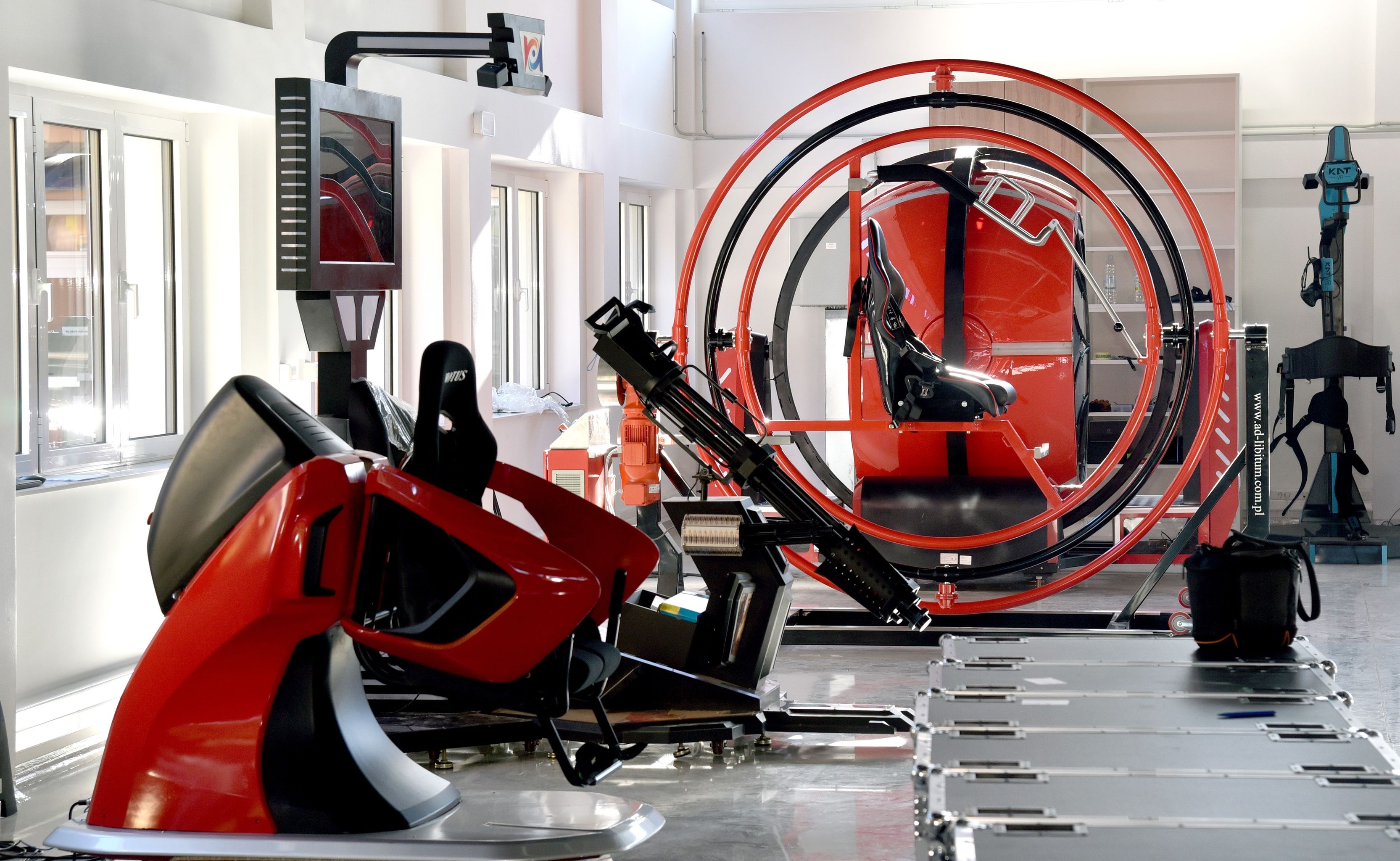
Gaming equipment inside one of the two renovated buildings in Novska / PISMO
Also, the vision for Sisak-Moslavina's town of Novska is to become not only the Croatian gaming industry center, but the regional center as well.
Namely, in only a few years, two new buildings have been equipped in Novska for the needs of the business incubator, and young video game developers have already started attending lessons at Sisak and Novska high schools.
In the future, the construction and opening of a faculty campus and an arena for sports are planned.
In addition to the gaming industry, the PISMO project also encourages the development of the metal industry, which has a long tradition in Sisak-Moslavina County with still untapped potential. The goal of the project is, of course, the development of entrepreneurship and the creation of conditions for new jobs in this county with a high unemployment rate.
Competition of 21 projects
The competition for the most successful EU projects in the Republic of Croatia was conducted by Jutarnji list in cooperation with the Croatian Union of Counties, the Office of the European Parliament in Croatia, and the Župan.hr project.
To participate in the competition, a five-member jury selected 21 projects, one from each Croatian county. Each of them was presented to the public in the printed edition of Jutarnji list newspapers and on the Novac.hr portal, from August 20 to September 7, 2020.
The election itself lasted from September 19 to October 10, when an online poll was open to the public. As part of the same competition, a five-member expert jury will also award prizes to projects in other categories such as contributions to the local and regional community, cross-border cooperation, and science and innovation.
The second place went to the project of Primorje-Gorski Kotar County entitled "Mala Barka 2: Preservation of the maritime heritage of the northern Adriatic" with 23 percent of votes, and third place went to Brod-Posavina County with the project "Innovative mind to smart schools - SMART SCHOOLS" with 13 percent of votes.
"Thank you to everyone who supported us, gave their vote, and helped the PISMO project to proudly win the title of the best and most successful EU project in Croatia!" reads the page of the PISMO Business Incubator.
Meet HGSS The Croatian Mountain Rescue Service
August 19, 2020 – All weather, all terrain, all year round – meet HGSS The Croatian Mountain Rescue Service, amazing volunteers who will never let you down
They're never far from the news. For the last two weeks, members of HGSS The Croatian Mountain Rescue Service have yet again been on the TV news every night. They're leading the search for a summertime visitor, a Polish hiker missing on Biokovo mountain.
But, watch again this winter and, for sure, they'll be in the headlines once more. Whether, they're scaling mountain ranges in the unbearable heat of high summer, searching underwater caves, flooded rivers or the sea, breaking through wild forest or trudging through metres of snow, they undertake their search and rescue missions over every terrain, in every weather condition, in every month of the year, all across Croatia. And, they all volunteers.
Marc Rowlands meets the head of service for HGSS The Croatian Mountain Rescue Service and three of its volunteers to find out who they are and what makes them do what they do.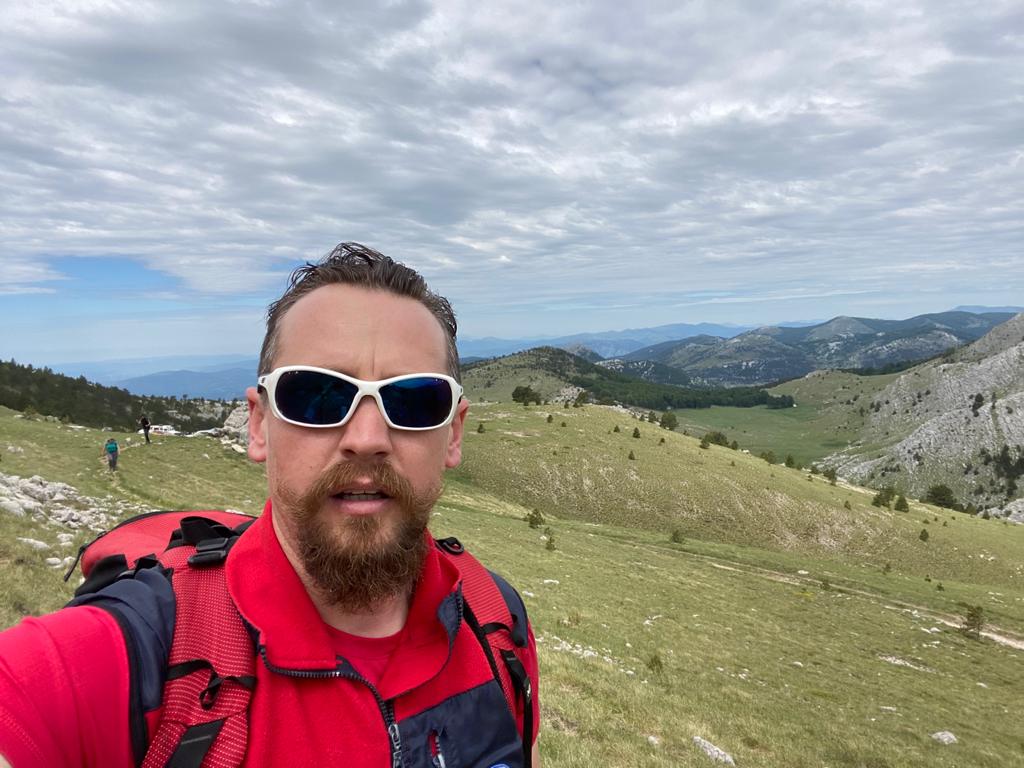
Josip Granić, head of service for HGSS The Croatian Mountain Rescue Service
My name is Josip Granić. I'm the Head Of Service for HGSS The Croatian Mountain Rescue Service. We've had an extremely busy couple of weeks. Being head of service for an organisation like this under such circumstances means you're always on the phone; co-ordinating, talking to outside organisations, members of the press. Communication. It's a 24/7 job, 365 days a year. If people need help, you can't take a holiday. Not at this level of the organisation.
We have around 1000 members. There are 11 paid positions in the main organisation and 25 people we pay to run the administration in each of the teams or stations we have. All of the members who perform the search and rescue are volunteers. We have pilots, surgeons, nurses, students, professors, every part of society.
I'm originally from Kaštela, but my home station is in Karlovac. I've been there for 15 years. I've been Head Of Service for two. Since I assumed the position, I've spent most of my time in the car. I travel all over Croatia.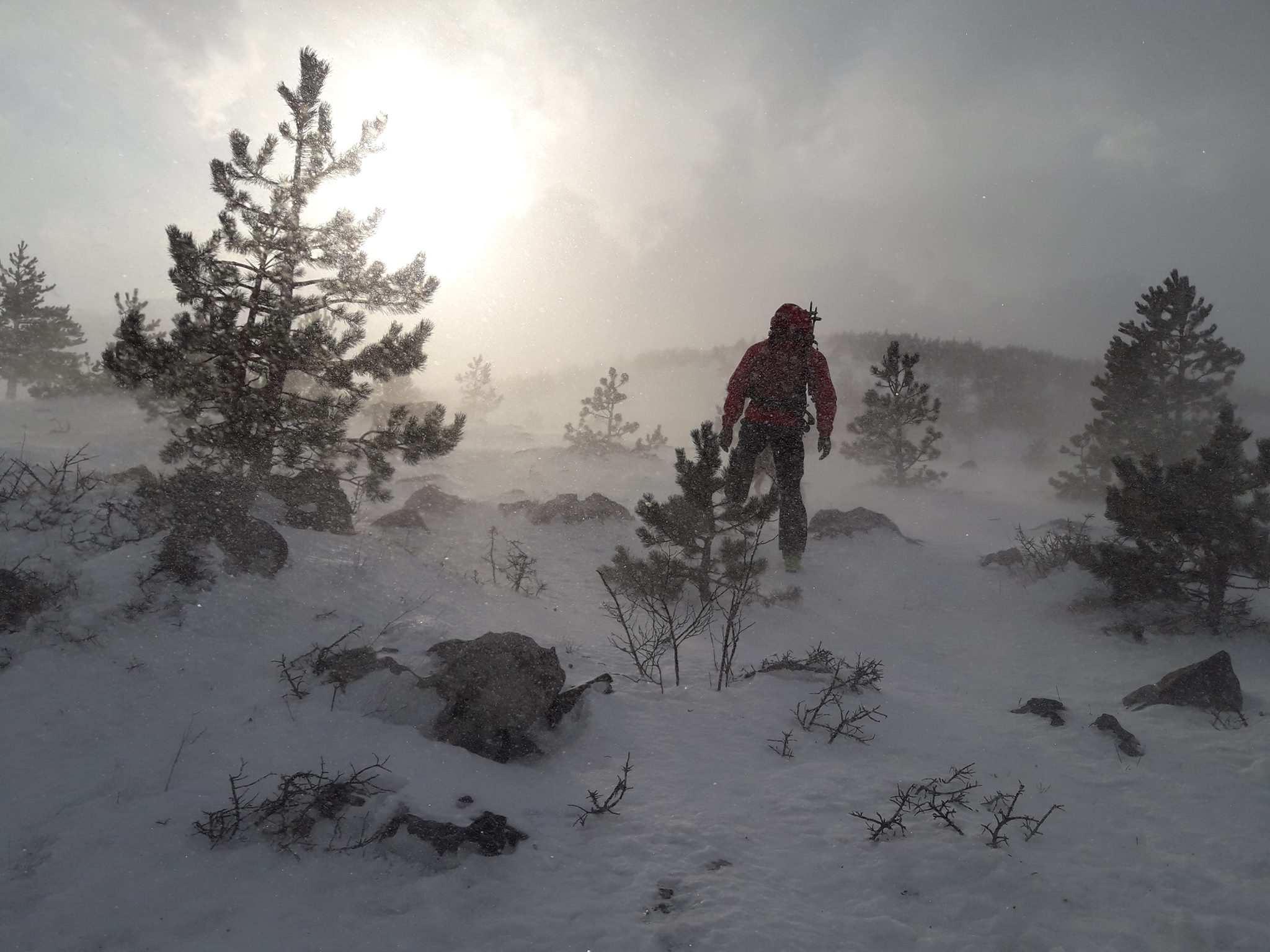
HGSS The Croatian Mountain Rescue Service missions can be hampered by extreme weather conditions © HGSS The Croatian Mountain Rescue Service
To get a certified position as a mountain rescuer in Croatia you all do the same training. It doesn't matter if you come from Slavonia, Dalmatia or Istria, you must have the knowledge and ability to deal with circumstances in any terrain; caves, pits, mountains, on snow, underwater.
Depending on where your station is, the type of call-outs you get could be very different. In Slavonia, 90% are for missing persons - searching forests, rivers, and in floods. We've had a big search on Biokovo mountain for the past 16 days. The stations from Split, Makarska, and Dubrovnik were at first involved, then teams from all over Croatia. It's not the same as Slavonia. The terrain is very different, so you have to be good at a particular set of skills. But, the largest percentage of call-outs is still missing persons. It's 70% of our work nationwide. The other 30% are rescues.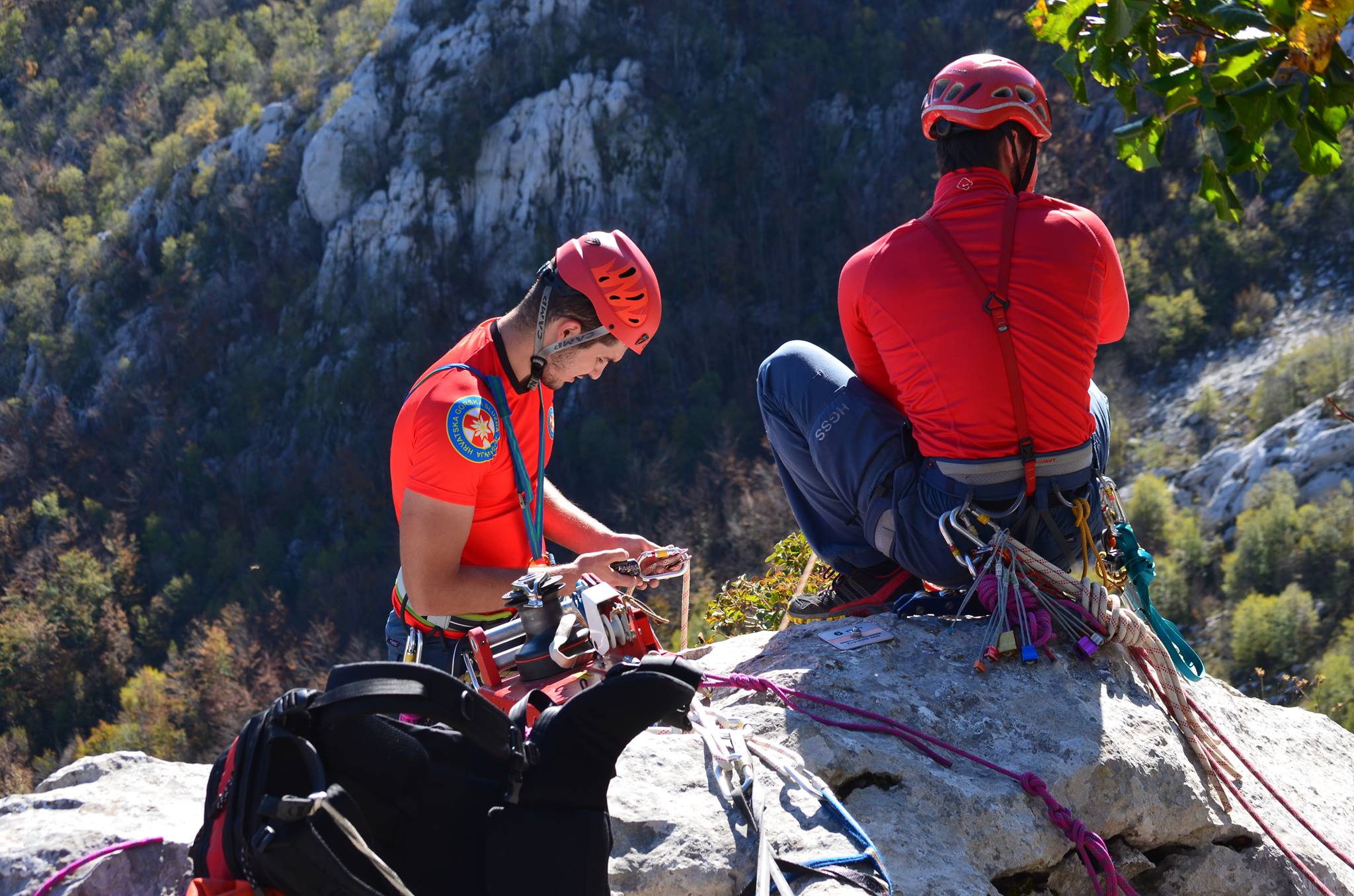
HGSS volunteers are educated to use a wide range of technical equipment. They are trained to operate in all the different kinds of terrain found across Croatia © HGSS The Croatian Mountain Rescue Service
There are usually 800 – 1000 missions a year across the country. We get roughly the same amount of calls in colder months as in warmer months. Only, winter months can be busier. The terrain is more difficult. There are some villages in Croatia – usually where the front line of the fighting was, around Karlovac, Kordun, Lika – and when it snows, it can be almost impossible to reach those places. But, some older people still live there. It can take days to reach them on snowmobiles, then skis, to deliver food or medecine. The other busiest places in winter are the ski resorts - Platak, behind Rijeka, and in Zagreb, on Sljeme. There are teams stationed in those places throughout the snow season.
What's the greatest danger of the job? Almost everything. Nothing in this job is easy. The greatest dangers we face are the same facing those that we rescue - underestimating the environment, nature, the conditions. That's where our training comes in.
In mountain rescue, we separate dangers into subjective, objective and technical. Subjective is the stuff you're guilty of - lack of preparedness, knowledge or equipment. Objective dangers are the ones you can't control, like sudden changes in weather, or avalanche. If you're sensible and informed, there should be no objective danger.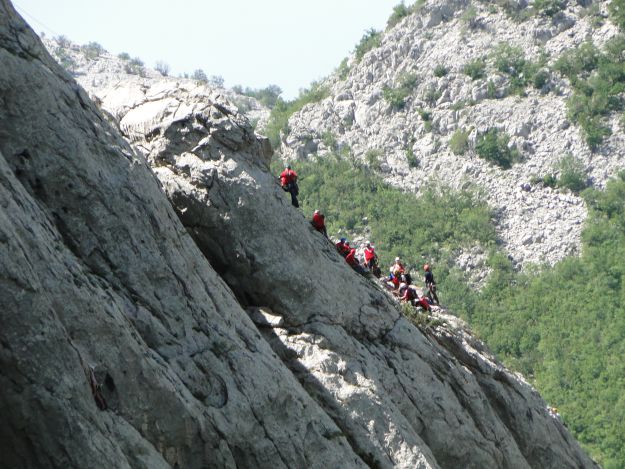
HGSS on a mission, clinging to a steep incline in Paklenica © HGSS The Croatian Mountain Rescue Service "People need to be aware at all times on the mountains. By the time most people think they may be in trouble, they've usually been in trouble for five or ten minutes already" Josip Granić.
80 – 85% of the people we rescue are Croatian. Only 15 – 20% are guests. People from Czech Republic, Slovakia, Poland, (Austria and Slovenia too) tend to enjoy nature more. They like hiking. That's the reason there are typically more rescues for those nationalities than there are for British, Belgian, French, Italian, America, Canadian or Australian guests. I don't remember the specific year, but sometime between 15 and 20 years ago we had a season where 5 or 6 Czech nationals were being searched for or, sadly, turned up dead. The media covered it and ever since there's been this myth that all the people who get into difficulty are Czech.
The question about expensive helicopter rides - why don't you charge the people you rescue - has been here forever. It's like this - if you're a tourist and you have a car accident in Croatia, the fire service, police and an ambulance will come. You won't get charged. We are a tourist country. According to international agreements, we are obliged to make everything safe for residents and guests alike. We are here, just like the fire service and police, to do our part. The Croatian air force is responsible for the helicopter rides and I have to give credit to them - they are crazy good pilots. Amazing. Even if we did charge everyone we saved - and most of the 85% of Croatians we save would struggle to pay - it still wouldn't be anywhere near the money required to run this service.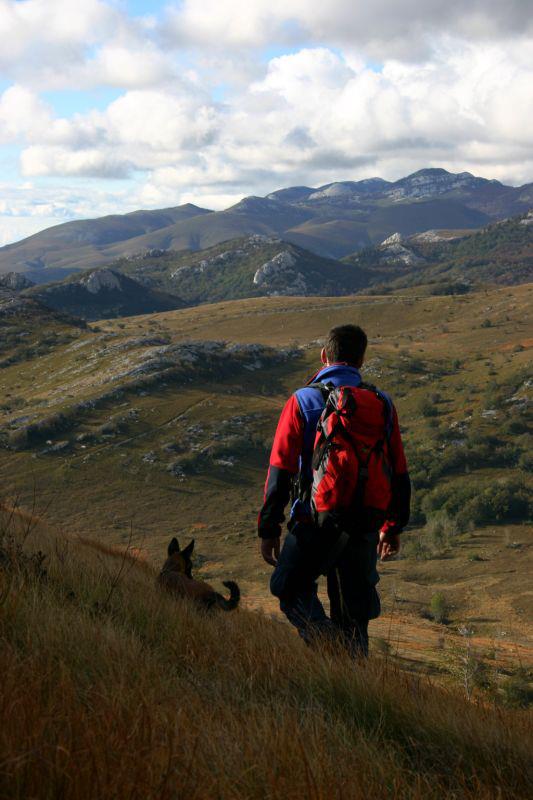
The Croatian Mountain Rescue Service used specially trained dogs on their searches © HGSS The Croatian Mountain Rescue Service
In 2007, I got a new search dog. It came from the Ogwen Valley Mountain Rescue service in North Wales. We cooperate a lot. We were sent out on a job to look for a three-year-old male child who had gone missing near Požega at the beginning of January, wintertime. His grandma was watching him and they were in a house on the edge of the woods. Early in the morning, he was playing with a dog. It suddenly ran into the forest and the boy chased after him. The grandmother didn't see it happen. I found him using my new dog, just after 8 o'clock the next morning. He'd been alone in the freezing forest for almost 20 hours.
Time is really moving fast on a job like that, because it's a kid and because it's so cold. Survival rates in such conditions are not good after 24 hours. When I found him, saw that he was alive, those big eyes looking up at me, it's a crazy feeling. You can't describe it. You can't compare it. A lot of positive emotions.
Every mission is special. We meet them all with the same level of determination and professionalism. But, it's the ones where you know you've really saved someone that stand out in the memory. Not the broken leg, where you transported someone – sure, that's an excellent job. But, when you know you've saved someone's life, that they definitely wouldn't be here now if it weren't for you, that's what makes it all worthwhile.
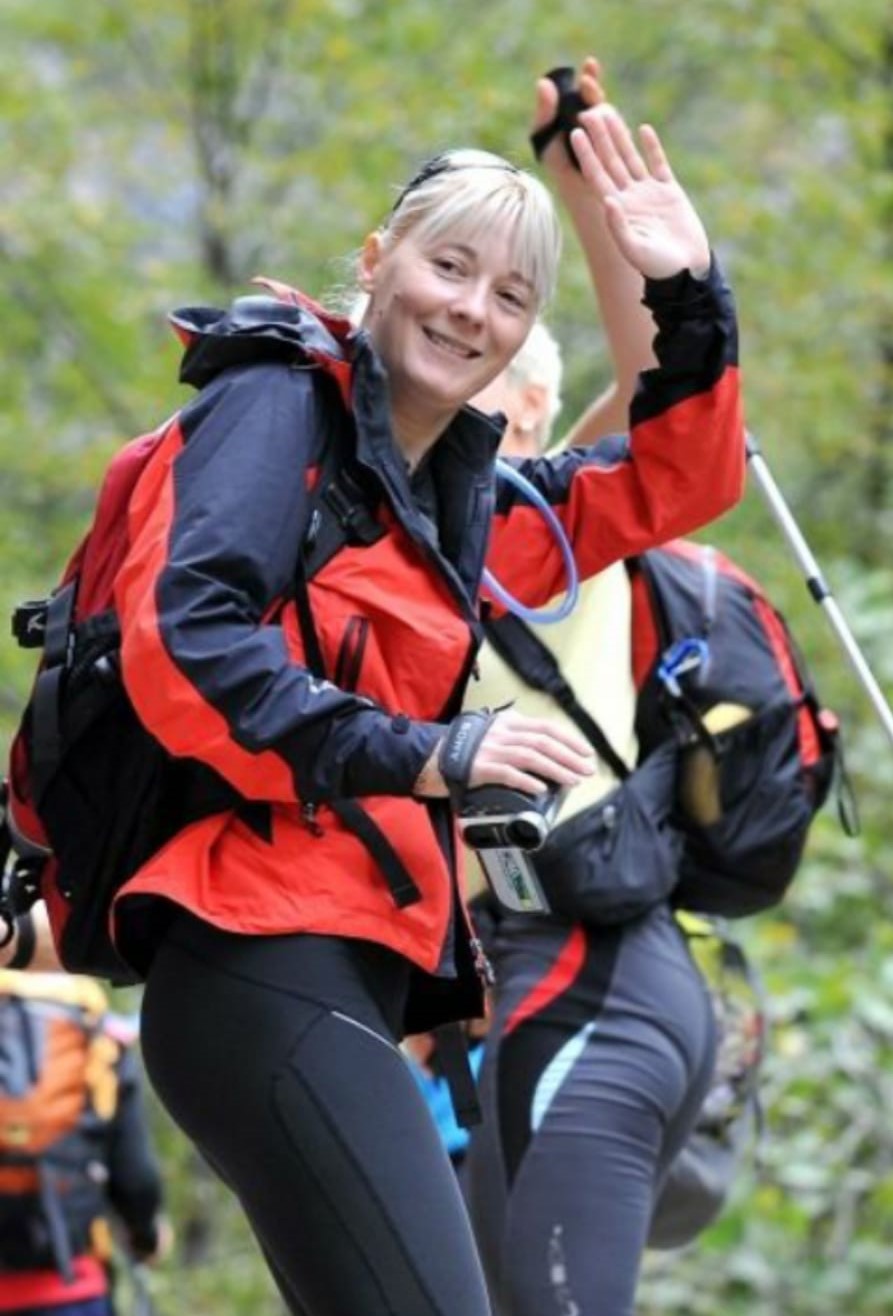
Jana Mijailović, volunteer for HGSS The Croatian Mountain Rescue Service
My name is Jana Mijailović, I'm 48 years old and I'm from Zadar. I finished school to be a teacher, but I never did it. My husband and I run a company that does plastic and aluminium windows for houses.
I started to go into the mountains when I was at high school. I never had the ambition to be part of mountain rescue services – people just noticed me on the mountains. They said I'd be good at it and asked me to join. I met my husband on the mountains. We are both volunteers for HGSS The Croatian Mountain Rescue Service. I've been doing it for 16 years.
I was a member of the first and second all-female Croatian expeditions to the Himalayas. We first climbed Cho Oyu in 2007, then Mount Everest in 2009. Croatia is the only country in the world that has only one successful male climber of Mount Everest, but four successful female climbers. I sometimes work as a guide too. I guess you could say I'm all about the mountains.
Being a climber, an Alpinist, I know that if I get into trouble, it's only my HGSS colleagues who can help. I feel this instinctively. I cannot be in the house, safe and warm, knowing that maybe someone needs help that only I can provide.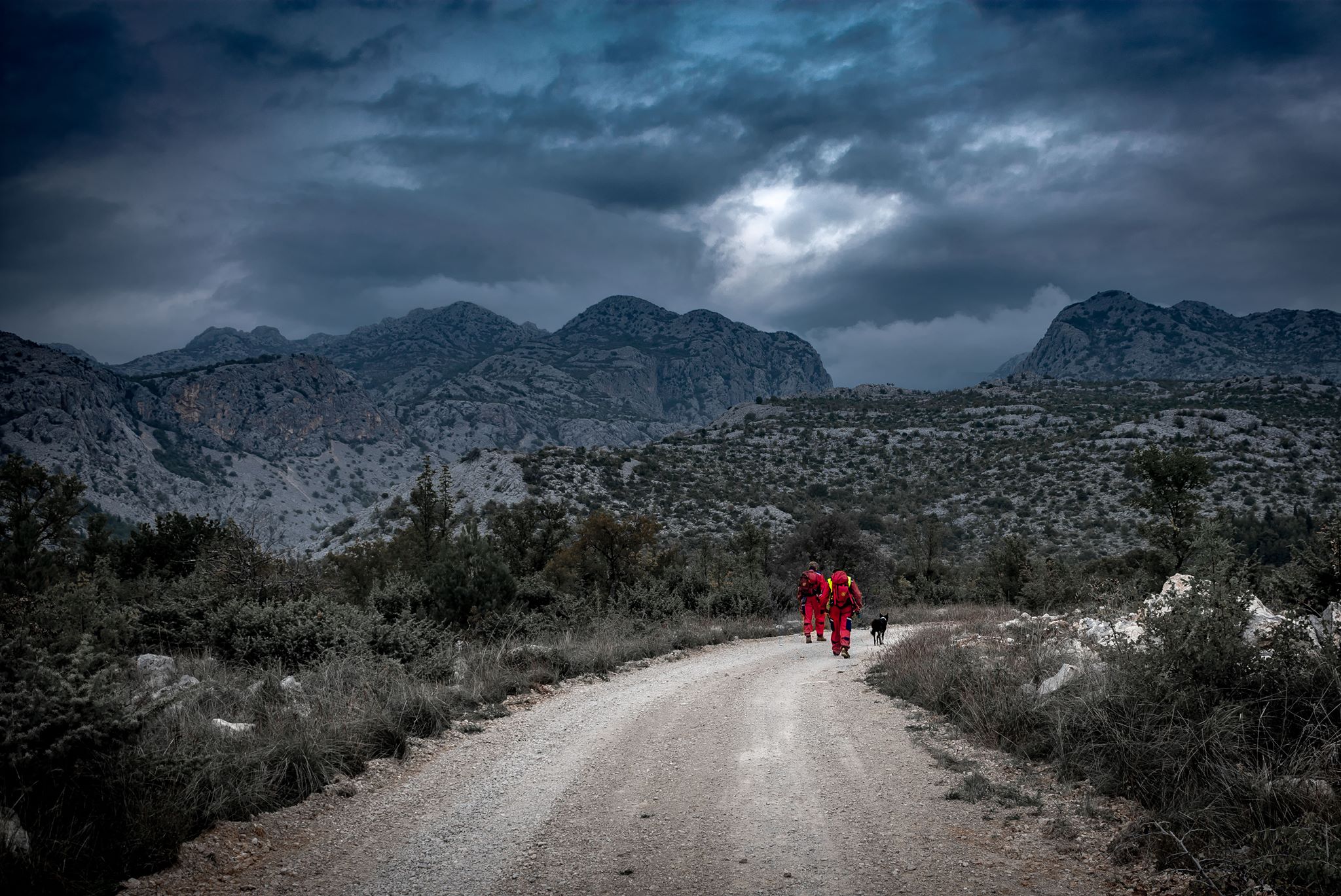
HGSS The Croatian Mountain Rescue Service members entering Paklenica under foreboding skies © HGSS The Croatian Mountain Rescue Service
I've really been on so many expeditions with HGSS. My station are on duty in the season at National Park Paklenica and I'm now the coordinator. Climbers from all around the world come and so there are many interventions. None of them are easy because the terrain is incredibly difficult. You really have to be in shape and know the techniques inside out.
I'm very proud of my statistics. Everyone I've rescued, who was alive when I reached them, is still living today. Unfortunately, not everyone we reach is alive when we arrive.
I remember one time, my husband and I were having dinner. We were arguing about the techniques and knots for moving a stretcher down a vertical climb. The training is so intense, you really have to know it well, and I guess that's just the kind of people that we are, that we would be arguing about it in our free time. Ha! He told me, "Why do you care? You'll never have to do that," because usually, it's really strong guys who do that specific job. If you're on a 400-metre-high section of rock, it really takes a lot of muscle.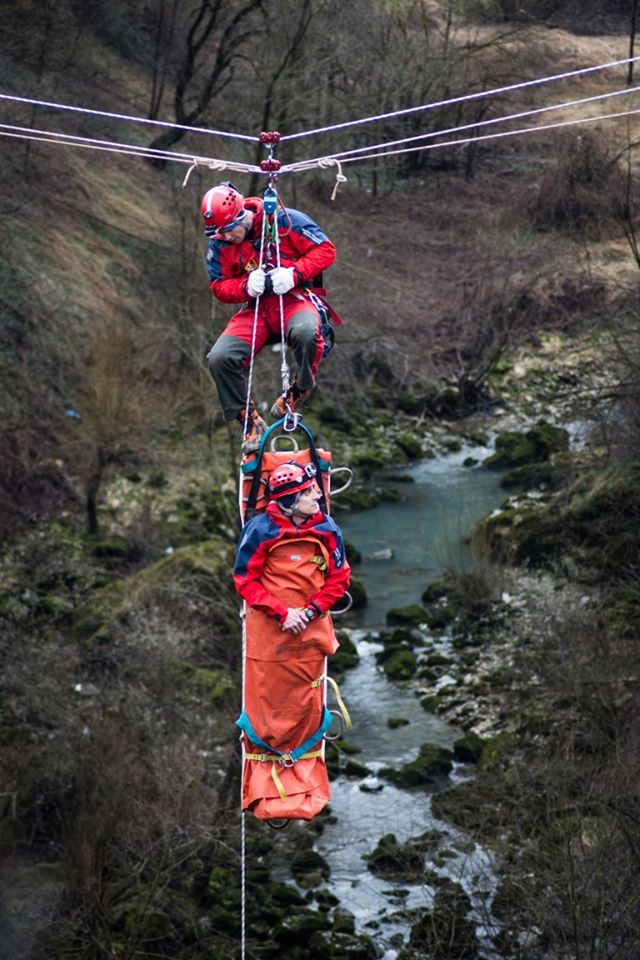
Ascending from a valley floor or descending from a mountain peak with a stretcher is a technically difficult operation, often hindered by darkness and adverse weather conditions. It requires a lot of training and a lot of muscle © HGSS The Croatian Mountain Rescue Service
In the evening, just two days later, we were called out to rescue an Italian guy who broke his leg on Anića Kuk. It's a really mighty part of the stone. And the leader of the expedition asked me to go on the stretcher. They pull you down on the ropes and you have to push very hard to keep the stretcher, the person you're carrying and yourself away from the rock, while balancing the weight of all three. It was dark, raining and with lots of Bura, the incredibly strong wind that sometimes hits us. That's probably my most memorable rescue.
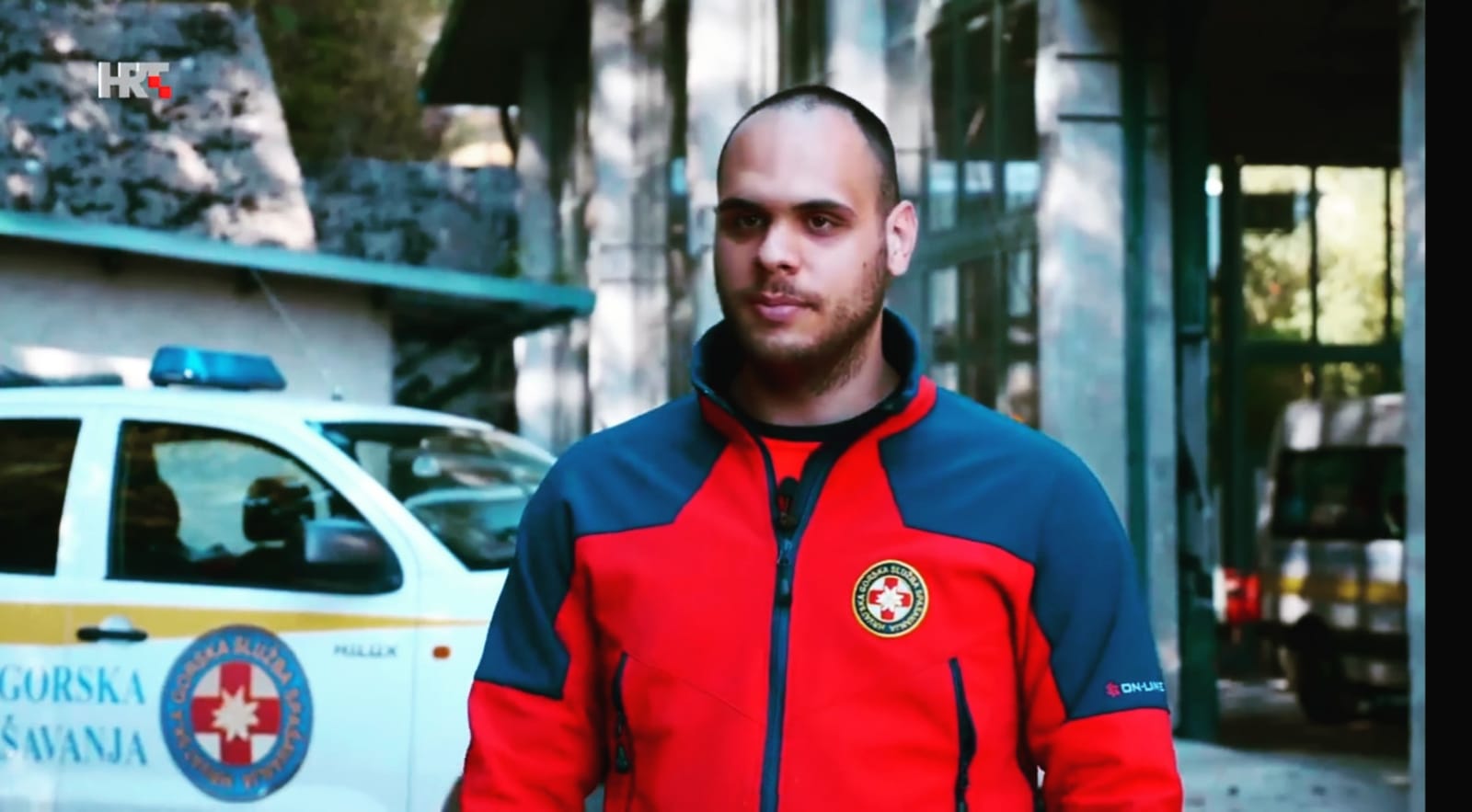
Petar Prpić, firefighter and volunteer for HGSS The Croatian Mountain Rescue Service
My name is Petar Prpić, I'm 25 years old and I'm from Hrvatska Kostajnica, just on the Croatian-Bosnian border. My station is in Novska. In my full-time job I'm a professional firefighter. I guess I have two dangerous jobs. Well, one job and one hobby.
I've always been interested in the outdoors – mountaineering, hiking, canoeing. But, that's not why I joined HGSS The Croatian Mountain Rescue Service. I just wanted to help people. I don't know, I guess it's just something in me.
We have a lot of rivers in our area. During the times of flood, we get a lot of call-outs. Our part of the country has a high percentage of elderly people in the population. A lot of them live in small villages, on the edge of the forest. We get a lot of call-outs for searches. Especially in the autumn when people go out looking for chestnuts or mushrooms. But, like all the stations in Croatia, we are here year-round if there are any actions in other parts of the country that need us.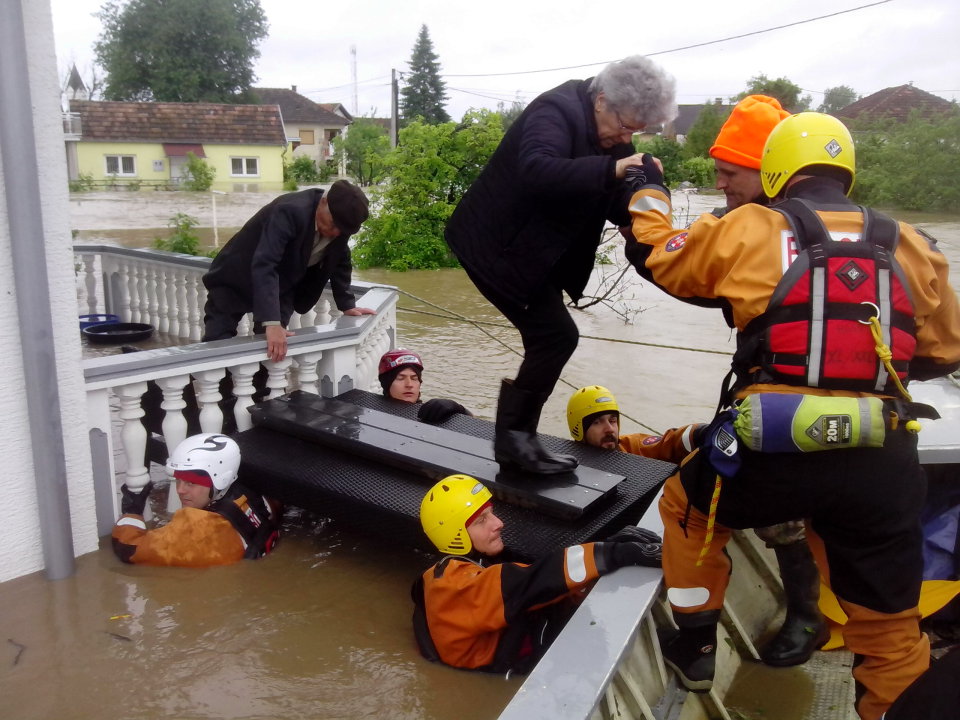
In some areas, HGSS The Croatian Mountain Rescue Service are frequently called out in response to flooding. This picture shows HGSS members on operation during the 2014 floods. In that year, flooding across the whole region was so bad that HGSS members operated not only in Croatia, but also donated their services to neighbouring Bosnia and Serbia © HGSS The Croatian Mountain Rescue Service
I was just on the search in Biokovo. The head of service called me and asked me to go. I first had to get some free days from my job. I called my boss, Zvonimir Ljubičić, chief of the fire department. He's great, very understanding, and he gave me permission. Two years ago I was called to Rab. Very hard operation, very difficult terrain.
Late last summer, we were called out to look for an older man near Glina. It was around 11 o'clock in the evening. He'd gone to look for mushrooms in the afternoon and never came back. Police were there and they sent for us.
The man had a cell phone on him, but there was no signal. There was no location given off the phone. We were a team of four, split into two teams. We went up into the woods above Glina and concentrated our search on areas where we could see there was no telephone signal on our phones. We were yelling in the dark. After an hour of search, someone answered. He'd been missing since 2pm. We found him at 2am. He was just lying there, uninjured but unwell, unable to move.
The reason it sticks in my mind is that the next day, in the morning, his daughter called me. She was so thankful, so emotional. For sure we saved his life. None of the other emergency services who were present could find him. It was down to us. We finished the operation at about 6am and then all four of us had to go immediately to our regular jobs.
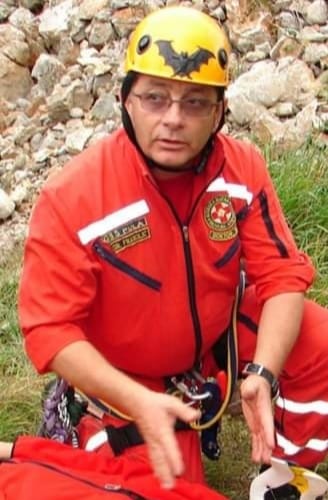
Mario Franolić, physician, ex-commando and volunteer for HGSS The Croatian Mountain Rescue Service
My name is Mario Franolić and I'm 60 years old. I'm the chief of the mountain rescue service in Istria. I travel throughout Croatia because I'm also an instructor for the medical commission of HGSS. I was born on island Krk. I'm based in Pula although I work in Rijeka. I travel a lot between the two. I've been with HGSS The Croatian Mountain Rescue Service for 18 years.
In my day job, I'm a physician. I am a senior mentor at the Institute for Underwater and Hyperbaric Medecine in the Clinical Hospital Rijeka. I'm an expert in my field of emergency medecine. I've been doing it for almost 30 years.
When I was young, I trained to be a physician in Belgrade. It was then the best medical faculty in Yugoslavia. At the same time, I also started spelunking (cave exploration). I've been doing it since 1978. Later, I was a physician in the military underwater commando unit. I lived in Austria for five years, but when I came to Pula, they were just starting the HGSS The Croatian Mountain Rescue Service station here. They asked me for help because they didn't have any medical professional on the team. I accepted. It would be a waste not to use all these skills I have.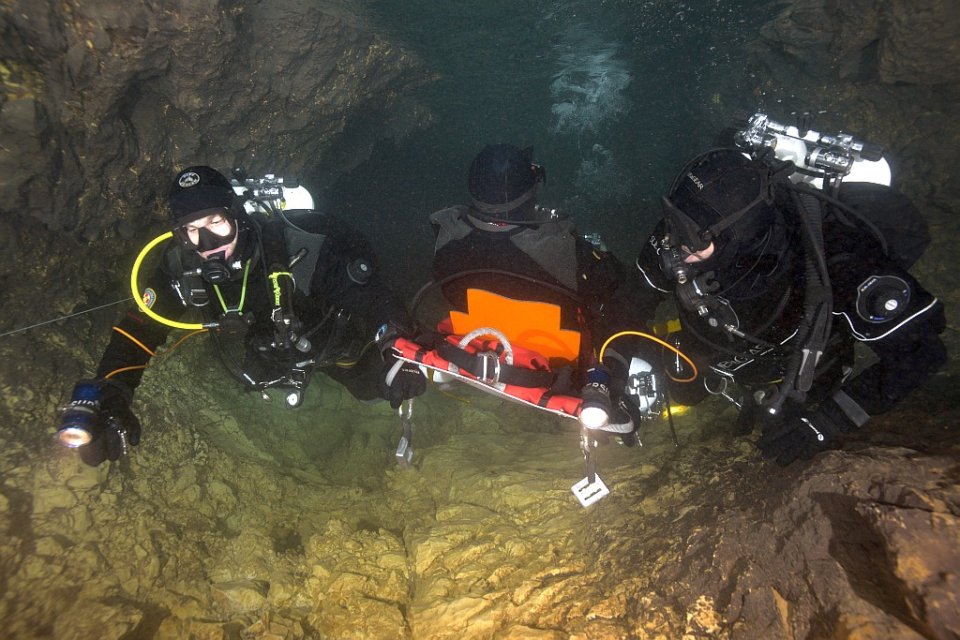
Specialist teams from HGSS are trained in underwater rescue from caves. Such caves exist all over Croatia in the karst rock, and also on some islands © HGSS The Croatian Mountain Rescue Service
Sometimes, our status as volunteers can give us problems. Although we have official duties, we are more like an NGO than something like the police. There can be legal implications. I remember one situation, very acute because a paraglider fell from the sky. None of his colleagues saw him fall. Paragliders go into the air together, but then they each branch off to do their own thing.
We had no idea about the location. We started from the last point of sighting, knowing that it could be very far from the place where he actually fell. But, we had to start somewhere. We had one mobile phone signal direction. But, you need three in order to locate someone. We only had a line on the map.
In the past, HGSS The Croatian Mountain Rescue Service sometimes had difficulties because the telephone companies wouldn't give us the information we needed in order to triangulate the position of a missing person. They would only give it to the police. But, it's a race against time. We searched for this man all day and all night. In the morning, some Croatian paragliders made private contact with a guy from the phone company. They begged him to release the information we needed. Although he could lose his job, giving such information to private citizens, he did it.
We found the man about 150 metres from where we were. Sadly, he was already dead. It was very small comfort to see that he had died instantly, on impact. It's unbearable when you reach someone you could have saved if only you had got there quicker, especially in an instance such as this, where we were hindered by a lack of information that was available. I think it moves more quickly now, but still we have to go through the police.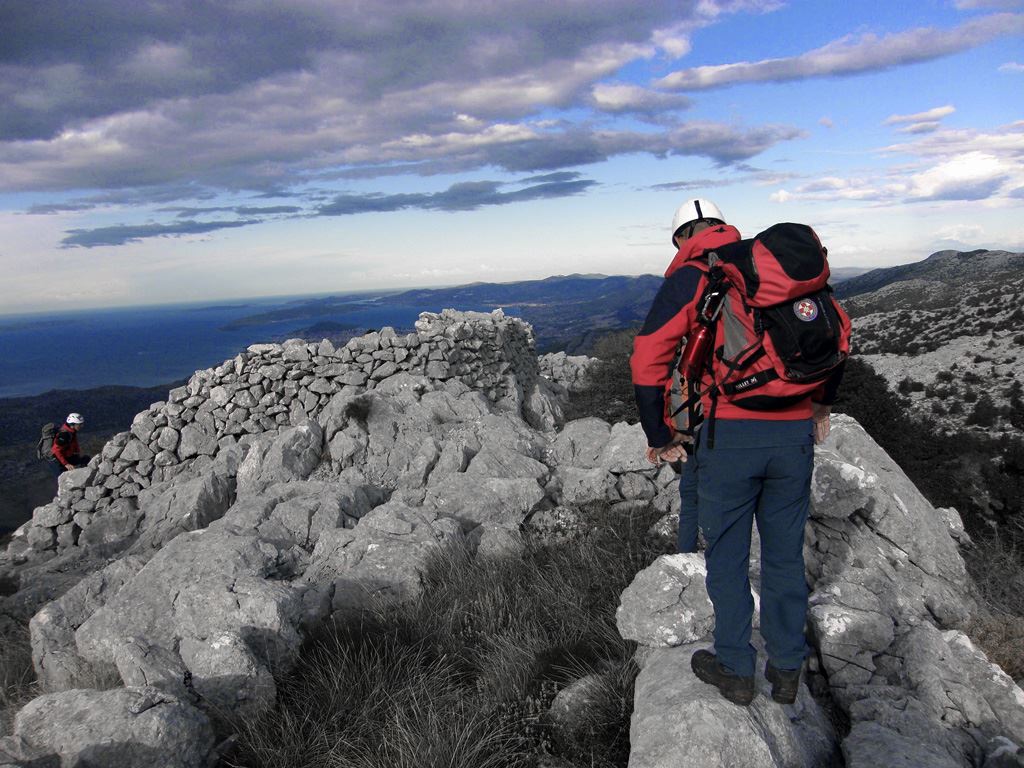
© HGSS The Croatian Mountain Rescue Service
One of the most emotional operations I went on was around five years ago, the rescue of a young girl - maybe two and a half to three years old – who got lost in the woods in a small place in central Istria. She chased into the forest after some dogs around 10 or 11 in the morning. The family saw immediately that she had disappeared and started to search. About two hours later, we were called out. It was impossible for the family to find her.
About 300 people came – my station, the Rijeka station, hunters, firemen, police and volunteers. In such an operation, the police are the lead service. But, 99% of the time they leave the organisation of the search to HGSS The Croatian Mountain Rescue Service. We are the only organisation who is very well educated in organising searches. When other people do searches, they use intuition. But, people all have different intuition. It can be chaotic. We are highly trained for this. There are procedures, recognised internationally, that we follow. We found her early in the morning, at around 7 o'clock. The dogs were lying on each side of her, giving her warmth.
All photos courtesy volunteers and HGSS The Croatian Mountain Rescue Service


